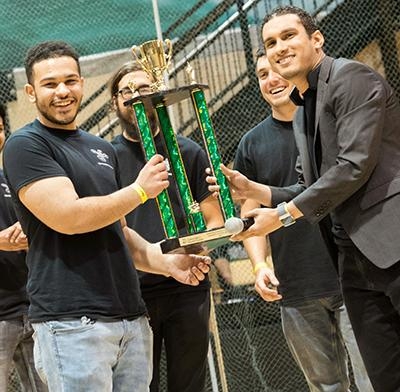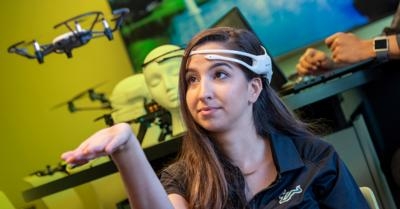Event Combines Technology And Neuroscience To Build Interest In Computer Science And Engineering
More than 300 attendees from the USF and Tampa community gathered at the University of South Florida to watch student pilots fly drones with nothing more than brain power.

Sixteen participants from across USF competed in a series of drone drag races at the 2019 Brain-Drone Race, held recently inside the Corral at Yuengling Center. USF graduate student Khaled Alshatti, a computer science and engineering major originally from Kuwait, became the first USF champion, taking home the trophy and a Tello drone from the event.
Sixty students signed-up for the qualifiers in January to earn the chance to race in the event. The top 16 went on to compete at the 1-on-1 drag race matchup. The USF students represented a variety of countries, including the United States, Kuwait, India, Bangladesh, Dominican Republic, Venezuela, Japan and Brazil.
“This was such an awesome event to be a part of,” Alshatti said after his win. “For me, this is the first time I’ve ever won anything, so it was definitely a cool experience.”
Marvin Andujar, PhD, assistant professor in the Computer Science and Engineering Department within the USF College of Engineering, organized this year’s race, along with his team of graduate students: Blanche Pinto, Sarah Garcia, Dante Tezza and Denis Laesker. He led the University of Florida group that first introduced the Brain-Drone Race in 2016. Andujar says the USF event, which he plans to hold annually, is a way to familiarize people with different areas of computer science through an engaging and interactive experience.
“We’ve had an incredible response to our first-ever Brain-Drone Race here at USF,” he said. “To see so many people interested in this technology and this sport is very exciting for us. Attendees were excited to control a drone with their brains themselves and formed long lines to try them out. This gives us motivation to scale the race further in the future.”

Brain-drone racing is made possible through the use of a segment of technology called brain-computer interfaces (BCI). A BCI is a device that creates a pathway between the brain and an external device, like a drone, computer or prosthetic limb.
Using a wearable electroencephalography (EEG) system, researchers are able to connect specific brainwave patterns to pre-programmed responses in the external device. For example, in drone racing, the user wears an EEG device to detect the electrical signal in the brain. A specific signal is then tied to a “fly forward” command in the drone. So, when the pilot produces the same signal during the race, the drone knows to fly forward.
BCIs have been in development for medical applications for decades. They can be used by patients to control prosthetic limbs and have even helped return partial sight to visually impaired individuals. In people with ALS, a neurodegenerative disease that destroys nerve cells and causes disability, the technology is also being refined to provide communication and mobility assistance.
While Andujar uses brain-drone racing as a platform to introduce technology and research to those outside his field, he also hopes to grow the sport. He says the nature of the technology makes the sport a perfect option for those with certain disabilities since it does not require any physical movement. He calls it a universal and inclusive sport since those with physical disabilities can compete against an able-bodied user without any disadvantage.
“We are happy to see USF host the world’s first official match of the Brain-Drone Racing League,” Andujar said. “We hope to see more universities follow USF’s path and leadership and grow this inclusive sport.”
(Images provided with USF news release and from file)
 ANN's Daily Aero-Term (05.01.24): Say Altitude
ANN's Daily Aero-Term (05.01.24): Say Altitude ANN's Daily Aero-Linx (05.01.24)
ANN's Daily Aero-Linx (05.01.24) Classic Aero-TV: Korean War Hero Twice Reborn
Classic Aero-TV: Korean War Hero Twice Reborn Airborne 04.29.24: EAA B-25 Rides, Textron 2024, G700 Deliveries
Airborne 04.29.24: EAA B-25 Rides, Textron 2024, G700 Deliveries Airborne Affordable Flyers 05.02.24: Bobby Bailey, SPRG Report Cards, Skydive!
Airborne Affordable Flyers 05.02.24: Bobby Bailey, SPRG Report Cards, Skydive!




